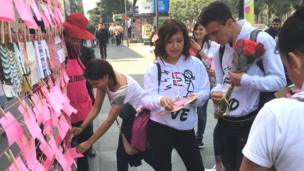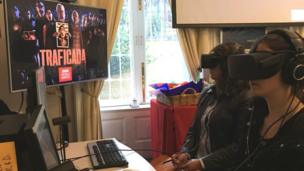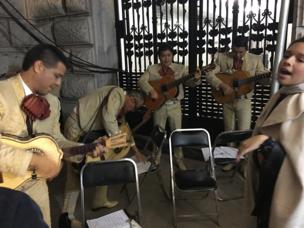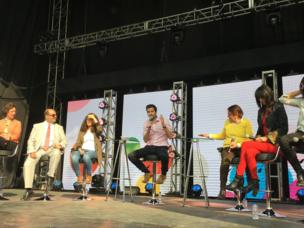Thousands of people have attended the BBC 100 Women season's first ever festival. The event in Mexico City showcased local dance, debate, music, comedy and art.
One of the most unforgettable experiences was a virtual reality story allowing those who put on the VR headset to vividly imagine the world of a young woman called Maria who is trafficked into slavery.
The character has been forced into prostitution, and her story is based on true events, and interviews conducted by the BBC.
Tears were shed by men and women of all ages as they sat on Maria's replica bed. This young woman never sees a single peso she makes for the men who stole her passport, freedom and, ultimately, her dignity.

Around the corner, rolling her wall of sticky notes across the streets of Mexico City, was Monica Mayor. She is one of Mexico's most prominent feminists and her message to young women is simple: 'It's OK to talk about your experiences of sexual abuse.'
The questions on Monica's pink wall asked probing questions, ranging from "What was your first experience of sexual harassment?'" to "When were you last abused?" which she joked darkly was probably 10 minutes ago.
This mobile exhibition aims to encourage a serious conversation, though. Sexual harassment is an every day experience for many Latin American women.
The range of answers was striking: One woman wrote that she was first abused by her cousin aged just five. The abuse lasted for two years. Many recounted stories of being followed and accosted on public transport. Other tales were even more harrowing.

One woman passed by the festival at mid-afternoon and quickly decided to stay for the rest of the day. And that was the experience of many in the heart of Mexico City. Some stopped for a few minutes, others for hours.
As the late afternoon sunshine beat down on the stage, it was time to witness the strength and skill of the female wrestlers - a group called Lucha Libre - who drew one of the biggest crowds of the day.
One of the group, Estrellita, revealed that childhood abuse led her to discover wrestling as a way to cope.

The public were also treated to electro cumbia music from DJ and hip hop artist Ali Gua Gua, while the street artist el skelleton worked away spraying his graffiti all over a huge wall.
In the first discussion of the day, on life in the home, sexuality and stereotypes, a man called Moises asked - on a small slip of paper - for advice on how to change his macho attitude which he admitted was jeopardising his marriage.
All this was overseen by the enigmatic comedian and actress Alexis de Anda, who was master of ceremony. She said the people of Mexico City were loving the festival: "They are giving everything, I really appreciate them being here," she said.

She joked that a lack of competition as a female comedian in Mexico made life easier for her, but says it's important to show the way for other women. "I like to push boundaries because we are still very conservative," she adds. "I like to talk about being a woman who is loud, smart, funny and sexy. You can be all of these things."
The Mexican government and women's rights activists clashed in a debate on how to stop street harassment.
The government claimed an app created for women to report abuse is not being used, nor are the thousands of pink whistles which have been handed out to women. The activists said the onus should be on men to not behave in that way in the first place, not on women to deal with the consequences better.

A key cornerstone of the festival was to give the audience a forum in which to discuss such issues.
"It's an industry of men and I hope that will change," said Angela Aguilar, the youngest performer at the festival, whose mariachi band is all male.
"Nobody has discriminated against me as a woman but I know that it does happen and I want it to change," the 13-year-old added.
Her headline performance was unforgettable, sending shivers down the spine of all those in attendance. It even drew street cleaners who turned up after their shift. Her penultimate song, one which her grandmother sang to her, proved particularly popular.
No comments:
Post a Comment